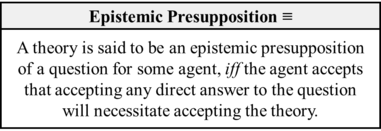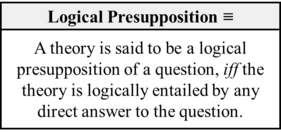Modification:Sciento-2021-0001
Accept the definitions of logical presupposition and epistemic presupposition.
The modification was suggested to Scientonomy community by Hakob Barseghyan and Nichole Levesley on 1 August 2021.1 The modification was accepted on 6 February 2023.
Contents
Preamble
While theories are answers to questions, questions themselves presuppose theories that are answers to other questions. For example, the question “What is the distance between the Earth and the sphere of stars?” presupposes the theories “The Earth exists”, “The sphere of stars exists”, and “There exists a distance between the Earth and the sphere of stars”, which are answers to other questions, i.e. “Does the sphere of stars exist?”, etc. It is widely accepted in the literature that any theory that is logically entailed by any possible direct answer (i.e. “a piece of language that completely, but just completely, answers the question”2p. 3 to a given question is a logical presupposition of that question.3p. 10 4p. 144 5p. 115 While it is straightforward to see that a theory can act as a logical presupposition for multiple questions, what is more worrying is that a question can have infinitely many logical presuppositions. Rescher shows that this is because “every logical consequence of a presupposition is itself a presupposition if only because p entails p-or-q”.3p. 11 That is, since every theory can have infinitely many logical consequences, a question can have infinitely many logical presuppositions. This infinity of presuppositions is problematic if we consider that in scientonomy, we primarily deal with agents with finite epistemic capacities, i.e. agents whose mosaics cannot hold an infinity of elements. If in order to accept a question, a given agent must accept an infinity of presupposing theories, it is not clear how any finite agent could accept any question. This modification thus suggests an account of epistemic presuppositions, which are agent-dependent and do not result in the same explosion as logical presuppositions.
Modification
Theories To Accept
- Epistemic Presupposition (Barseghyan-Levesley-2021): A theory is said to be an epistemic presupposition of a question for some agent, iff the agent accepts that accepting any direct answer to the question will necessitate accepting the theory.
- Logical Presupposition (Barseghyan-Levesley-2021): A theory is said to be a logical presupposition of a question, iff the theory is logically entailed by any direct answer to the question.
- Epistemic Presupposition Exists: There is such a thing as an epistemic presupposition.
Questions To Accept
- Subtypes of Epistemic Presupposition: What are the subtypes of an epistemic presupposition?
Questions Answered
This modification attempts to answer the following question(s):
- Epistemic Presupposition: What is epistemic presupposition? How should it be defined?
- Logical Presupposition: What is logical presupposition? How should it be defined?
- Existence of Epistemic Presupposition: Does an epistemic presupposition exist?
Verdict
The modification was accepted on 6 February 2023. It was emphasized that the "modification is appealing given the presence of questions as a basic class of epistemic element in our ontology and the need to reference their presuppositions in observational scientonomy alongside proposed laws concerning questions in theoretical scientonomy".c1 The commentators agreed that "an epistemic agent could plausibly accept all the epistemic presuppositions without necessarily accepting all the logical presuppositions".c2 They also also noted that "accepting separate definitions of logical presupposition and epistemic presupposition would improve the specificity of our communal knowledge - and perhaps our visualization capabilities".c3 Specifically, "there is clear value in distinguishing logical and epistemic presuppositions in scientonomic diagrams".c4 Finally, the commentators highlighted the importance of the distinction for the law of question acceptance.c5 c6
Click on the Discussion tab for comments.
References
- ^ Barseghyan, Hakob and Levesley, Nichole. (2021) Question Dynamics. Scientonomy 4, 1-19. Retrieved from https://scientojournal.com/index.php/scientonomy/article/view/37120.
- ^ Belnap, Nuel D. and Steel, Thomas B. (1976) The Logic of Questions and Answers. Yale University Press.
- a b Rescher, Nicholas. (2000) Inquiry Dynamics. Routledge.
- ^ Sober, Elliott R. (1986) Explanatory Presupposition. Australasian Journal of Philosophy 64 (2), 143-149.
- ^ Wiśniewski, Andrzej. (1995) The Posing of Questions: Logical Foundations of Erotetic Inferences. Springer.

